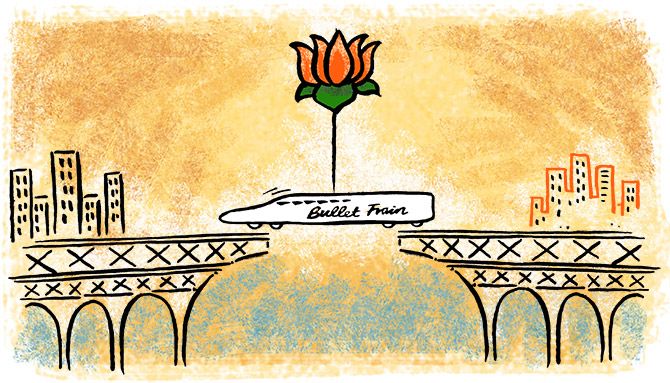While farmers in Gujarat are rejecting the compensation package, those in Maharashtra say they do not wish to part with their land for a project that largely benefits Gujarat.
Illustration: Dominic Xavier/Rediff.com

The prime minister’s favourite project - the bullet train between Ahmedabad and Mumbai - is not only facing hurdles in land acquisition in Gujarat and Maharashtra but may evolve into a major election issue in the upcoming Lok Sabha polls, say political pundits in Ahmedabad.
While farmers in Gujarat are rejecting the compensation package offered in accordance with the Jantri rates, which are lower than the market rates, farmers in Maharashtra (led by the Maharashtra Navnirman Sena) say they do not wish to part with their land for a project that largely benefits Gujarat.
In Gujarat, the opposition Congress has sprung into action - with senior Congress leader Ahmed Patel writing to the Prime Minister - seeking his intervention in the matter.
Political analysts such as Vidyut Joshi say the BJP is on a sticky wicket here: “They (the BJP) fully understand the repercussions of annoying the rich farmers of South Gujarat, but they are unable to take their side, given this is a pet project of the PM himself.
"If the land acquisition issue snowballs, this might become a major pain for the BJP in the upcoming Lok Sabha elections next year.”
The Japanese government, which is providing a Rs 88,000 crore loan (Rs 880 billion) for the Rs 1.1 trillion project, has flagged concerns that hurdles in land acquisition may delay the commissioning of the project.
The deadline for completion is August 2022. Japan has indicated that given the delays in getting land, the project could be commissioned by the end of 2023.
As such, no land acquisition has happened. Reports suggest that only 0.9 hectares have been acquired in Bandra Kurla Complex in Mumbai, from where the bullet train starts.
The project covers 508.9 km, of which 487 km is an elevated corridor, and the remaining 22 km is underground (in the Thane creek).
About 192 villages in Gujarat and around 120 in Maharashtra would be affected by the project.
Bhagubhai Patel, a mango farmer in Valsad district of Gujarat and a former senior employee at a cooperative bank, said this was the peak mango season in Gujarat. Land acquisition at this time is tricky.
South Gujarat is the state’s hub of mango cultivation. Farmers here expect around Rs 50 lakh per acre for their land that has mango orchards.
The agencies are talking of compensation on the basis of the prevailing jantri rates.
The implementing agency for the project - National High Speed Rail Corporation (NHSRC) - is organising stakeholder meetings in villages of Gujarat.
It is planning to complete the land acquisition in Gujarat by December. However, in recent meetings held with farmers, NHSRC representatives had to face their anger.
“They are not worried about gaining farmers' consent for parting with their land. They come to show some presentation.
"A day before the meet, a small advertisement is given in some local dailies. Many do not even get to know about the meeting, let alone participate,” Patel said.
The meets in Nadiad and Vadodara turned hostile.
In villages of Valsad district, the prevailing Jantri rates are around Rs 600,000-700,000 per acre, while the market rates are much higher at Rs 50 - 60 lakh per acre for land parcels in the interiors.
Land adjoining the national highway comes for around Rs 1 crore per acre, claim farmers.
Similarly, in areas around Surat, the jantri rate works out to be around Rs 60-70 lakh per acre, while farmers claim the prevailing market rates are Rs 3-4 crore per acre.
While the leader of the opposition in the Gujarat assembly, Amit Chavda, could not be reached despite several attempts, district-level leaders of the Congress, however, said that the “high-handedness” of the ruling party might prove to be costly.
“Farmers in South Gujarat are traditionally pro-BJP. However, they would not part with their land without adequate compensation.
"If the NHSRC (and in turn the state government) tries to coarse these villagers, the results would be felt in the upcoming Lok Sabha elections," said a Congress leader from a South Gujarat district.
The BJP spokesperson too could be not be reached for a comment.
Sagar Rabari, head of the Gujarat Khedut Samaj, which champions farmers’ rights, said the organisation had written to the Japan International Cooperation Agency (JICA), intimating it about violations of the JICA’s guidelines (related to land acquisition).
"We plan to hold a demonstration before the Japanese embassy in New Delhi soon if the implementing agency does not pay heed to our demands,” Rabari said.
Given the people’s anger, the bullet train is unlikely to see the light of day by 2022.











